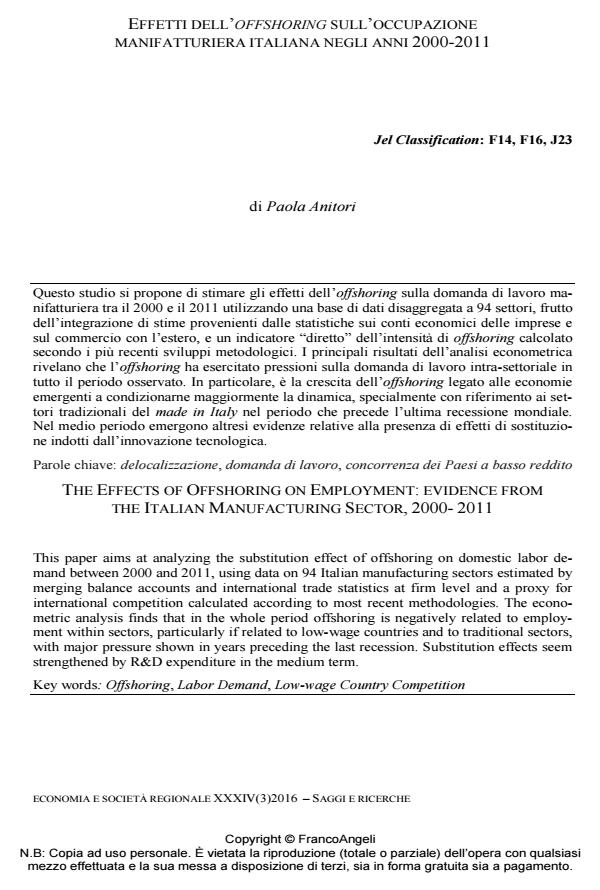Effetti dell’offshoring sull’occupazione manifatturiera italiana negli anni 2000-2011
Titolo Rivista ECONOMIA E SOCIETÀ REGIONALE
Autori/Curatori Paola Anitori
Anno di pubblicazione 2017 Fascicolo 2016/3
Lingua Italiano Numero pagine 37 P. 144-180 Dimensione file 675 KB
DOI 10.3280/ES2016-003009
Il DOI è il codice a barre della proprietà intellettuale: per saperne di più
clicca qui
Qui sotto puoi vedere in anteprima la prima pagina di questo articolo.
Se questo articolo ti interessa, lo puoi acquistare (e scaricare in formato pdf) seguendo le facili indicazioni per acquistare il download credit. Acquista Download Credits per scaricare questo Articolo in formato PDF

FrancoAngeli è membro della Publishers International Linking Association, Inc (PILA), associazione indipendente e non profit per facilitare (attraverso i servizi tecnologici implementati da CrossRef.org) l’accesso degli studiosi ai contenuti digitali nelle pubblicazioni professionali e scientifiche.
Questo studio si propone di stimare gli effetti dell’offshoring sulla domanda di lavoro manifatturiera tra il 2000 e il 2011 utilizzando una base di dati disaggregata a 94 settori, frutto dell’integrazione di stime provenienti dalle statistiche sui conti economici delle imprese e sul commercio con l’estero, e un indicatore "diretto" dell’intensità di offshoring calcolato secondo i più recenti sviluppi metodologici. I principali risultati dell’analisi econometrica rivelano che l’offshoring ha esercitato pressioni sulla domanda di lavoro intra-settoriale in tutto il periodo osservato. In particolare, è la crescita dell’offshoring legato alle economie emergenti a condizionarne maggiormente la dinamica, specialmente con riferimento ai settori tradizionali del made in Italy nel periodo che precede l’ultima recessione mondiale. Nel medio periodo emergono altresì evidenze relative alla presenza di effetti di sostituzione indotti dall’innovazione tecnologica.
Parole chiave:Delocalizzazione, domanda di lavoro, concorrenza dei Paesi a basso reddito
Paola Anitori, Effetti dell’offshoring sull’occupazione manifatturiera italiana negli anni 2000-2011 in "ECONOMIA E SOCIETÀ REGIONALE " 3/2016, pp 144-180, DOI: 10.3280/ES2016-003009